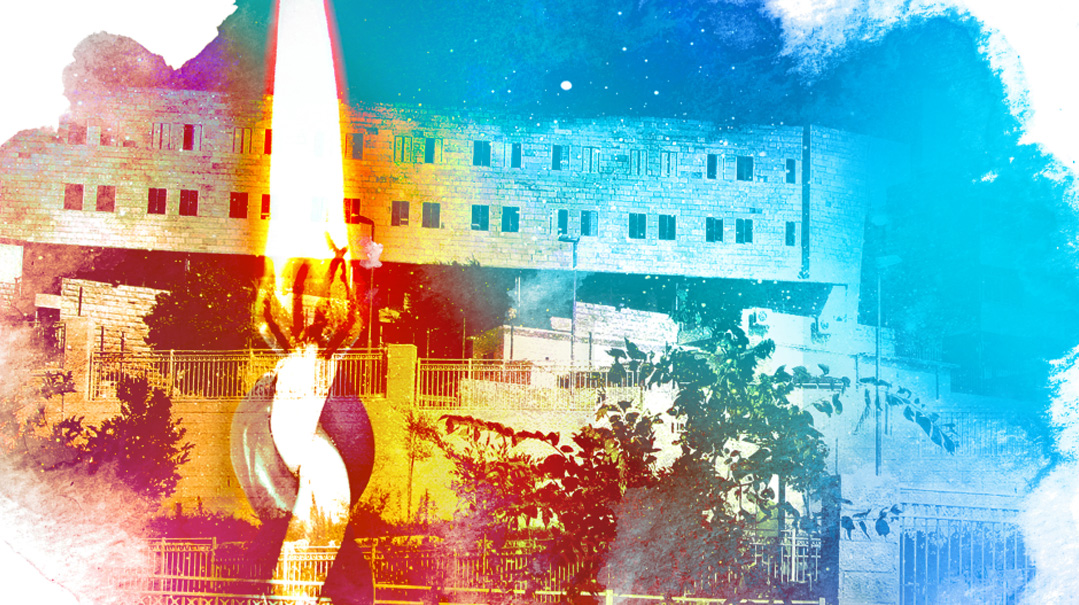One Final Havdalah


Rebbetzin Bruria David’s life embodied the Torah concepts of kavod and tzniyus, words that defy translation

What is tzniyus? Is it modesty? Inwardness? Humility? It’s a word that has no sufficient English translation, and is made poorer by the attempt. Rebbetzin Bruria David’s life embodied the Torah concepts of kavod and tzniyus, words that defy translation.
When our editorial team put out a call for “short, powerful memories” following Rebbetzin David’s petirah last week, alumnae pointed out that Rebbetzin David always downplayed that which was flashy but fleeting; she taught, instead, that spiritual growth results from the steady accumulation and reiteration of basic fundamentals, rather than from the thrilling moments of inspiration. Sound bites, she taught us, reduce the great and the awe-inspiring to banal clichés.
A magazine whose craft relies on the anecdote and the pithy quote cannot, by its very nature, do justice to someone whose life was about the serious, the measured, the majestic.
And yet, at the behest of daas Torah, we could not send a magazine to print without marking, albeit in some small and inadequate way, the loss of the great mechaneches of our era. Her impact reached far beyond the thousands she taught directly, extending to her students’ children and grandchildren, their students and students’ students.
Students also reminded us that Rebbetzin David encouraged us to read biography. Despite emphasizing that the genre often contained errors, whether factual inaccuracies or subjective interpretations by the author, she felt there was much to gain by reading about great people. At the same time, she cautioned, one must read about gedolim with awe and humility, remaining cognizant that they were human and struggled, but on a far different plane than regular people.
And so, it is with trepidation and humble acknowledgment of the shortcomings of our medium that we endeavor to paint a small picture of the impact that Rebbetzin Bruria David wielded on the world of chinuch habanos.
The Rosh Yeshivah’s Derech
Rebbetzin David never spoke for the general public, and refused every offer or request to address chinuch panels or discussions — yet she impacted so many students who went on to become teachers of Torah. Her graduates became the mechanchos of the next generation. Seminary and high school principals and teachers in Eretz Yisrael and throughout the US would call her for guidance long after graduation and pattern their curricula and goals after her vision.
All of the chinuch Rebbetzin David imparted was deeply rooted in the mesorah she received from her father, Rav Yitzchok Hutner, whom she always referred to simply as the Rosh Yeshivah; Rebbetzin David was the only child of Rav Hutner and Rebbetzin Masha (Lipshitz). Anyone who knew her understood that her main identity was that of eishes chaver of Rav Yonoson David, rosh yeshivah of Pachad Yitzchok in Har Nof. Harking back to Slabodka’s ethos of gadlus ha’adam, her behavior embodied the dignity and gravitas of bygone days; every action was thought out and in accordance with the dictates of halachah and mussar. Students describe tremendous passion, but always under the rule of prodigious intellect.
“In every nuance, you learned hierarchy and appropriateness,” says Mrs. Zlata Press, principal of Prospect Park Yeshiva and a longtime student of Rebbetzin David. “She didn’t give speeches, she was it. She created for us and her talmidos a sense of hierarchy in all areas.”
That sense of hierarchy was inextricably bound up with kavod: the reverence due to that which has weight, substance, permanence. Above all, that kavod was due to Torah and those who learned it.
It was these attitudes and lessons that she would impart in the seminary she founded in the early 1970s, BJJ — officially titled Machon Sarah Schenirer, and known among insiders as “The Machon.” The five-story building on 38 Sorotzkin — once just the living quarters, later to serve as both dormitory and classrooms — is unassuming, nondescript; a squat, sprawling building clad in ageless Jerusalem stone. But its walls transformed thousands of lives.
BJJ is famous for its relatively short list of rules.
“She didn’t create rules, she set standards,” says Mrs. Pnina Alster, menaheles of Migdal Seminary in Lakewood. “And in her presence, you wanted to live up to those standards.”
Her educational standards were rigorous, because she believed in her students’ potential to meet them. The curriculum was challenging for virtually all the students — even those with strong backgrounds — and they spent hours over seforim in an attempt to gain both breadth and depth of knowledge. The point was not to create female talmidei chachamim, emphasizes Mrs. Alster, but that through learning and connecting to Torah, a person refines her daas and brings her avodas Hashem to ever-higher levels.
She didn’t hesitate to tell her students when they made mistakes, remembers Dr. Ruchama Fund, who was one of Rebbetzin David’s earliest students in Beth Jacob Hebrew Teachers’ College on the Lower East Side, as well as a mother and grandmother of BJJ talmidos. She saw the boundless potential in every person, and the concomitant responsibility to live up to it. If you were mistaken in thought or action, she wouldn’t flatter you with empty platitudes, Dr. Fund recalls; she believed in you more than you believed in yourself, and would spur you to accomplish what she knew you could.
Oops! We could not locate your form.






